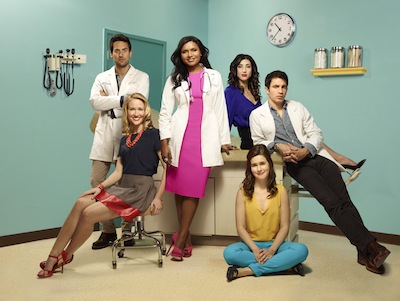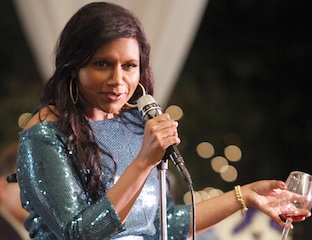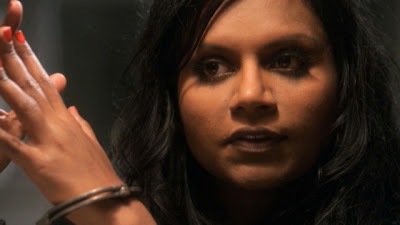Tag: Mindy Kaling
Bitch Flicks’ Weekly Picks
Megan‘s Picks:
“No Love in the Wild” [on Beasts of the Southern Wild] by bell hooks via NewBlackMan (in Exile)
Black Power Takes Center Stage at TIFF with Angela Davis Documentary by Melissa Silverstein via Women and Hollywood
Fox Host to Scarlett Johansson: “You’re Worth Millions” — Pay for Your Friends’ Contraceptives “Instead of Asking Me” via RH Reality Check
Gender, Power, and Chris Brown’s Battered Woman Tattoo by Lisa Wade via Sociological Images
James Cameron: ‘Hollywood Gets Action Women Wrong’ by Hadley Freeman via The Guardian
From Lena Dunham to Junot Diaz, How to Write People Who Aren’t You by Alyssa Rosenberg via ThinkProgress
Mandy Patinkin Left Criminal Minds Over Show’s Subversive Misogyny by Alex Cranz via FemPop
Everything You Need to Know About SNL’s New Lady Cast Members by Intern Scarlett via Bust Magazine
Amy Poehler Teaches You to Feel Better About Your Body by Lindy West via Jezebel
Stephanie‘s Picks:
‘Marigold’ and ‘Moonrise’: Summer 2012 Indie B.O. Champs by Scott Myers via Go Into the Story
TIFF Programmer Dishes on Film Roles for Women, George Clooney and Saying No by Derek Carkner via CityNews Toronto
Is Parks and Rec the Most Feminist Show on TV? by Emily Heist Moss via Rosie Says
Beginning to See by Karina Longworth via Slate
Feminist Africa Issue 16. 2012: African Feminist Engagements with Film via African Gender Institute
A Woman Among Warlords via Indiegogo
In Defense of “Bachelorette’s” Mean Girls by Willa Paskin via Salon
The New New Girl: Mindy Kaling Promotes Herself Out of The Office and Into The Mindy Project by Jada Yuan via Vulture
‘The Mindy Project’ : A Case for the Female Anti-Hero
 |
| ‘The Mindy Project’ premiers Sept. 25 (the pilot is available on Hulu). |
Mindy Kaling’s new sitcom, The Mindy Project, gives us the rare fully flawed female anti-hero in a prime-time comedy. What’s striking in the pilot episode (Hulu is previewing the pilot before the show premiers on Fox on Sept. 25), is that Mindy’s character, Mindy Lahiri, an OB/GYN, isn’t particularly lovable. In fact, she’s kind of an asshole.
And it’s great.
Lahiri gets trashed and attempts to ruin her ex’s wedding. She loves romantic comedies in a completely shallow, selfish way. She makes inappropriate (even racist) jokes. Was I being seduced by the fact that M.I.A. was blasting in the background during the show’s climax? Why did all of this work so well for me?
 |
| Lahiri, at her ex’s wedding, drunkenly insults the couple (including jabs at his new wife’s ethnicity). |
I realized that it felt good to see an unlikable female protagonist. It felt good to see a true female anti-hero. Of course, it’s clear that we are supposed to root for her, and can do so easily. Lahiri as a protagonist fits in more with Sterling Archer, Michael Scott, Larry David and Jeff Winger than she would with Leslie Knope and Liz Lemon. We accept men as lovable assholes, but for women it’s often a different story.
The expectations we have for female characters in entertainment rival the expectations we have for women in our culture. Be funny, but not crude. Be pretty, but not vain. Be confident, but not prideful. Be excellent at your career, but don’t sacrifice love and motherhood. Be sexy, but not sexual.
Our expectations for men are much simpler, and less impossible. In fact, the expectations could be characterized as “lack thereof” (this is problematic in its own way). Perhaps this is the reason why we embrace the male anti-hero (whether it’s a sitcom, hour-long drama, film or Ernest Hemingway novel). Audiences expect men to be crude, shallow and unpleasant on many levels. These low expectations open up countless opportunities for complex male characters.
 |
| “I’m sorry, disorderly conduct? Aren’t there rapists and murderers out there?” Upon release from her arrest, Lahiri shows little remorse. |
Don’t get me wrong, I love Knope and Lemon. Knope’s character–the entire show, really–is a shining example of feminism in practice. Lemon is flawed, but is also hyper-self-aware and apologetic for herself in many ways. Both of those characters want to be liked. Lahiri (a true model Millennial) doesn’t seem like someone who would apologize to anyone. She just wants it all.
I look forward to having a relationship with a female anti-hero like I have with so many male anti-heroes on TV. I look forward to laughing and/or cringing at some of the character’s words and actions. Lahiri is not what we’ve been taught is the ideal. She’s real, and says and does things that don’t “fit” the ideal mold. Of course it goes without saying that seeing a curvy woman of color in a leading role feels pretty amazing.
We don’t need every female protagonist to be a true hero. We simply need more complex depictions of women–the good, the bad and the accurate. We shouldn’t expect our female protagonists to keep sweet any more than we should ourselves.
A reviewer at The Atlantic Wire, in a disappointed review of the pilot, says of the show’s premise, “… I’m worried this particular setup might not be the one. Bawdy talk in an OB/GYN office followed by drunken antics in a mini dress is all well and good, I guess. But Kaling, to some of us at least, has always seemed a bit better.”What does this mean, exactly, besides A. the show is too feminine, and B. she should be “better” than bawdiness and drunkenness? That’s not the point and is the whole point, all at once.
Lahiri grew up in an era of idealized depictions of love and womanhood via Meg Ryan and Sandra Bullock rom-coms. She wants that happy ending, but doesn’t seem to want to change herself for it. She’s clearly excellent at her career. At the end of the day–and at the end of the episode–she just wants to get laid. So she does.
She smiles toward the camera and we’re invited not to judge, and not to clutch our pearls and wish for a more perfect female character. We’re simply supposed to come along for the ride.
—
Leigh Kolb is a composition, literature and journalism instructor at a community college in rural Missouri.
Bitch Flicks’ Weekly Picks
Flick Chicks: A guide to women in the movies by Mindy Kaling for The New Yorker
Kickstarter campaign for ‘The Punk Singer is Kathleen Hanna’ by Sini Anderson
Tomi-Ann Roberts on the sexualization of girls from SPARK Summit
CNN’s “Gender Identity: A Change in Childhood” from Bitch
Early Signs of a “Bridesmaids” Bump by Rebecca Traister for Salon
The Cost of a Non-Diverse Media by Ariel Dougherty for Ms.
Book Excerpt: Where Have All the Girl Bands Gone by Courtney E. Smith from Women and Hollywood
Man Up: The CEO of “Light Beer” Takes Issue with Miller Lite from The Good Men Project
Why Is TV Suddenly Overstuffed With Buxom Bunnies, Sexy Stewardesses, and Charlie’s Angels? by Sarah Seltzer & Julianne Escobedo Shepherd for AlterNet
Sex, Gender, and Dancing with Chaz Bono by Barbara J. King for NPR
Leave your links in the comments!
